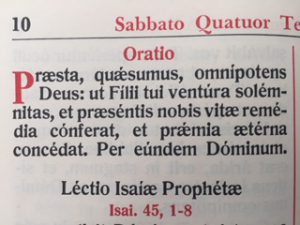 From a reader…
From a reader…
QUAERITUR:
Father, I recently saw “eundem” in a misallette. My missal uses “eumdem.” I was wondering if these are different cases of the same word (like German den/dem) or if they are just different spellings of the word (or misspellings?).
Eumdem is a legitimate form, though not preferred in the Classical period. The predominate form, even well into Mediaeval Latin, is eundem.
Be mindful that, in classical times, Latin was more “nasal” sounding than it is in our Italian/Roman ecclesiastical pronunciation. Endings with “m” were strongly up in the nose, as it were. This is a reason why endings started to drop off in late Latin and early Italian.
That said, the eundem form is the older, more classical and preferred form. The m of eum at times morphed into an n in the presence of the voiced dental. In post-Classical Latin the m reasserts itself now and then, perhaps because eum is the accusative which is being slammed into the indeclinable suffix –dem.
I find eundem attested first in Ennius, Plautus, etc. I find eumdem attested much less frequently and first in Cicero De legalibus and Celsus De medicina and, after that, in early Christian writers such as Cyprian of Carthage Ad Quirinum and Lactantius De ira Dei. Augustine uses both forms, but I didn’t look to see if he uses the n form in quotations.
I don’t see any pattern of preference.
It could be that there were regional preferences. If could also be that orthography variations and the helpful “corrections” of copyists played a role. Either way, both forms are legit, though eundem is correcter than the other.


































Interesting. So this would also explain the different spellings in the Athanasian Creed in Latin? (quicunque vs. quicumque)
[Maybe, and maybe not. First of all the m form is by far preferred across all time periods. Also, the game changer with eundem could have been the voiced dental. In this case we have a weaker, unvoiced consonant. That said, I am sure that these variations popped up for some of the same reasons as I mentioned, above. Quicumque is heavily attested in Virgil, Propertius, Tibullus, Ovid, etc. It has a useful, jaunty rhythm, after all. Latin Fathers use it. However, Juvenal and Tertullian sport quicunque here and there. Augustine has it once in a sermon. Jerome trots it out pretty often, but he also uses the m form.]
… and it could be that I am always impressed when I pop in here to see “was ist los”. I keep trying to not make you into an infallible hero so I won’t get too disappointed when your clay feet inevitably make an appearance. It is a privilege to have access to the content I encounter here every day.
What about “Regina caeli” vs. “Regina coel” and “quotidianum” vs. “cotidianum” (cf. Pater noster)?
While we’re dealing with nuts and bolts, I’m a linguist, but not a classicist, although I play one for a Catholic homeschool coop where I teach high-school and younger Latin classes.
I’ve been thinking lately why we have so many preposed genitives as opposed to postposed genitives in the titles of conciliar documents or papal encyclicals, as an example.
For instance, why do we get so many like “Amoris laetitia”, “Dei verbum”, “Veritatis splendor”, “Redemptoris missio”, “Redemptoris mater”, “Anglicanorum coetibus” with preposed genitives?
..but also “Redemptor hominis”, “Evangelium vitae”, “Lumen fidei”, “Lumen gentium” with postposed genitives, which is my understanding of where these go in Latin.
Or is word order simply that free? [It is pretty free. However, in the case of titles of document, it was once necessary to see also the rest of the sentence… because there was a “rest of the sentence”. It seems to me that with Laudato si and Amoris laetitia, someone came up with the two word title before the rest of the sentence was written and then the first sentence was crafted around the title. A dopey way to work, but that is what I think they are doing these days. Especially because the lack of the rest of the sentence after Amoris laetitia led to some hilarious and not entirely dignified suppositions.]
Of course, I meant “Regina coeli”!
It is also spelled eúmdem in the closing prayer of the Angelus in my copy of The Little Office of the BVM by Baronius Press